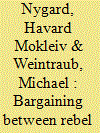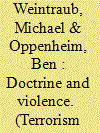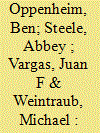|
|
|
Sort Order |
|
|
|
Items / Page
|
|
|
|
|
|
|
| Srl | Item |
| 1 |
ID:
140001


|
|
|
|
|
| Summary/Abstract |
Although military cooperation among rebel groups in multi-party civil wars could help rebels defeat or extract concessions from an incumbent government, violent conflict among rebel groups is empirically prevalent. Why do rebel groups in multi-party civil wars choose to fight one another? This article models the strategic dilemma facing rebel groups in multi-party civil wars as an alternating-offer bargaining game of incomplete information with an outside option. The game-theoretic model explores the relationship between the status quo distribution of power among rebel groups, the costs of fighting, and the likelihood that one rebel group will opt to unilaterally end bargaining over a set of goods, such as access to supply routes, natural resources, and control over civilian populations. We show that the likelihood of violent conflict between rebel groups is lowest when the status quo distribution of benefits reflects the existing distribution of power.
|
|
|
|
|
|
|
|
|
|
|
|
|
|
|
|
| 2 |
ID:
156919


|
|
|
|
|
| Summary/Abstract |
Military theorists and practitioners have long argued that training shapes how combatants treat civilians during war. Yet there is little systematic evidence regarding the impact of training on wartime behavior, and almost none for non-state armed groups, despite the fact that such groups intensively train their fighters in order to shape their behavior towards civilian populations. This article argues that among insurgent groups that emphasize the strategic and tactical importance of restraint towards civilian populations, political training can reduce civilian killings. We test the observable implications of our theory in the case of Colombia, using survey data on former Revolutionary Armed Forces of Colombia (FARC) insurgents and sub-national data on civilian killings. We find support for our hypothesis, with results that are robust to a range of model specifications and controls, including alternate sources of combatant discipline and obedience, such as military training and punishment.
|
|
|
|
|
|
|
|
|
|
|
|
|
|
|
|
| 3 |
ID:
141181


|
|
|
|
|
| Summary/Abstract |
Anti-insurgent militias and states attempt to erode insurgent groups’ capacities and co-opt insurgent fighters by promising and providing benefits. They do so to create a perception that the insurgency is unraveling and to harness inside information to prosecute more effective counterinsurgency campaigns. Why do some insurgents defect to a paramilitary group and others exit the war by demobilizing, while still others remain loyal to their group? This article presents the first empirical analysis of these questions, connecting insurgents’ motivations for joining, wartime experiences, and organizational behavior with decisions to defect. A survey of ex-combatants in Colombia shows that individuals who joined for ideological reasons are less likely to defect overall but more likely to side-switch or demobilize when their group deviates from its ideological precepts. Among fighters who joined for economic reasons, political indoctrination works to decrease their chances of demobilization and defection to paramilitaries, while opportunities for looting decrease economically motivated combatants’ odds of defection.
|
|
|
|
|
|
|
|
|
|
|
|
|
|
|
|
| 4 |
ID:
174725


|
|
|
|
|
| Summary/Abstract |
The explosion of cities and megacities has increased scholars’ and policy markers’ attention to the effects such changes might have on conflict: increasingly, urban environments may alter the nature of warfare but not necessarily the incidence of intrastate war. We argue that high levels of urban concentration—the concentration of populations in one or relatively few urban centers—increases both the likelihood of civil wars and their intensity. Urban concentration limits the ability of the state to project power across space, exacerbating grievances in rural areas, easing rebel control of territory, and enhancing their military strength. At the same time, cities become high-value loci of contestation even as urban warfare constrains conventional state military strength. The result is more symmetrical fighting producing more battle deaths. Cross-national regressions show that urban concentration exerts a crucial effect on the likelihood, nature, and intensity of intrastate warfare.
|
|
|
|
|
|
|
|
|
|
|
|
|
|
|
|
|
|
|
|
|